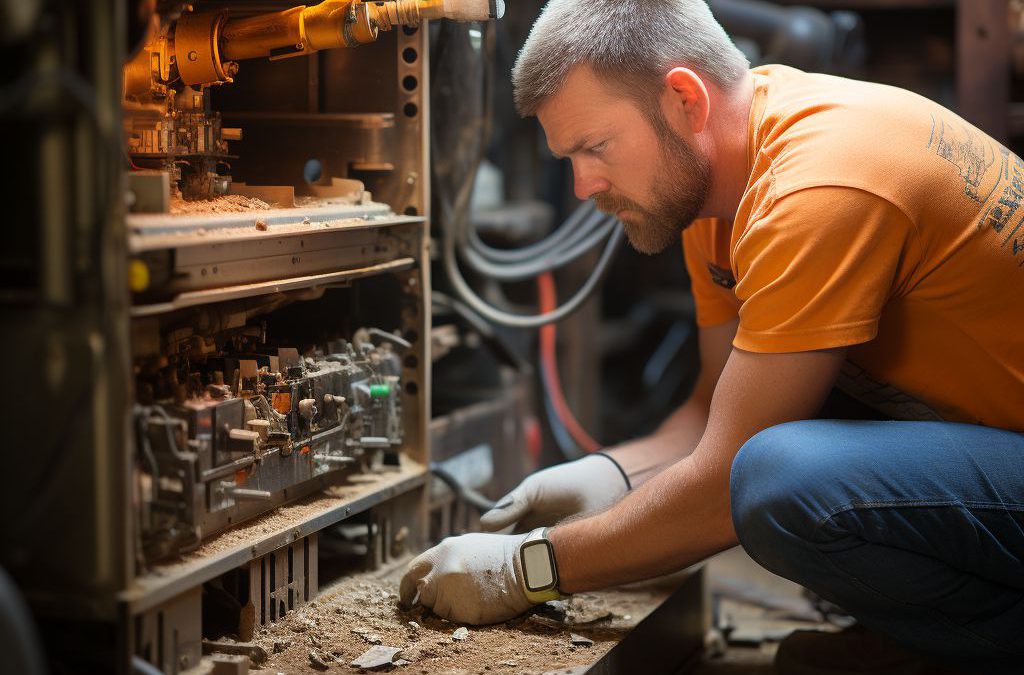As temperatures start to drop, furnaces become a crucial part of our households. Whether you live in a cold climate or it’s just chilly during some months, furnaces keep us cozy and warm. But what happens when you neglect the maintenance of your furnace and don’t clean it regularly? The answer might surprise you – dust buildup, decreased efficiency, and even potentially dangerous situations. In this article, we’ll discuss in detail what happens if your furnace is not cleaned, and the steps you can take to keep your furnace in top-notch condition.
Tabe of Contents
- 1. The Importance of Regular Furnace Maintenance
- 2. Signs of a Dirty Furnace: How to Tell When It Needs Cleaning
- 3. The Consequences of Neglecting Your Furnace: How It Can Affect Your Health and Wallet
- 4. DIY vs. Professional Furnace Cleaning: Which One to Choose?
- 5. Tips for Maintaining a Clean Furnace and Avoiding Costly Repairs
- People Also Ask
- Conclusion
1. The Importance of Regular Furnace Maintenance
Regular furnace maintenance is crucial to ensure that your furnace operates efficiently and safely. A well-maintained furnace will not only provide warmth during the cold winter months but also help you save money on your energy bills. On the other hand, neglecting your furnace can lead to several problems, including costly repairs, safety hazards, and premature replacement of the equipment.
There are several things you can do to maintain your furnace and keep it running smoothly. The first step is to schedule an annual furnace inspection with a professional HVAC technician. During the inspection, the technician will check and clean the furnace components, including the ductwork, air filter, blower motor, and ignition system. They will also check the carbon monoxide levels and ensure that the furnace is operating safely.
In addition to professional maintenance, there are a few things you can do to maintain your furnace between visits. For instance, you should change your furnace filter regularly and keep the area around the furnace free of clutter. You should also ensure that the furnace vents are not obstructed and clean the furnace components that you can access safely.
Maintaining your furnace is an investment in your home and health. Neglecting your furnace can lead to a variety of problems that can impact your wallet and wellbeing. Therefore, it is essential to have a regular maintenance schedule in place to ensure that your furnace operates efficiently and safely.
2. Signs of a Dirty Furnace: How to Tell When It Needs Cleaning
If you want your furnace to function at its best, it’s crucial to clean it regularly. However, most people neglect this critical task until it’s too late, resulting in costly repairs or replacement. To help you avoid such expensive mistakes, we’ve compiled a list of warning signs that indicate your furnace needs cleaning:
1. Poor Air Quality
If you notice your indoor air is stuffy, dusty, and full of pollutants, it’s probably due to a dirty furnace. When your furnace filter is clogged with dust and debris, it doesn’t filter air efficiently, allowing allergens, bacteria, and other irritants to circulate in your home. This can lead to respiratory problems, allergies, and other health issues if left unchecked.
2. Increased Energy Bills
If you’re surprised by how much you’re spending on heating bills, it might be time to check your furnace. A dirty furnace works less efficiently, wasting energy, and causing your heating bills to skyrocket. According to the US Department of Energy, you could save up to 15% on your energy bills by cleaning or replacing your furnace filters regularly.
3. Strange Furnace Noises
If you hear unusual sounds coming from your furnace, such as banging, clanking, or whistling, it’s often due to built-up dust and debris interfering with its functioning. These noises are usually an indication that it’s time to clean your furnace to prevent further damage.
By paying attention to these warning signs, you can prevent costly furnace breakdowns and keep your home cozy and safe. In the next section, we’ll explore the consequences of neglecting your furnace and how it can affect your health and finances.
3. The Consequences of Neglecting Your Furnace: How It Can Affect Your Health and Wallet
Neglecting your furnace and forgetting to clean it can have serious consequences on your health and wallet. Here are a few reasons why:
1. Increased Energy Bills: A dirty furnace can cause problems with its efficiency, leading to a spike in your energy bills. When vents and filters are clogged, the furnace has to work harder and longer to heat your home. This not only results in higher energy bills, but it also shortens the lifespan of your furnace.
2. Poor Air Quality: A dirty furnace can also have a significant impact on the air quality inside your home. When your furnace is not cleaned regularly, dust and other particles accumulate inside the system, which are then circulated throughout your home. This can cause respiratory problems, allergies, and other health issues.
3. Risk of Carbon Monoxide Poisoning: The risk of carbon monoxide poisoning increases significantly if your furnace is not cleaned regularly. Carbon monoxide is a colorless, odorless gas that can be emitted by a malfunctioning furnace. It’s important to have your furnace inspected by a professional to ensure that it is functioning properly and to prevent the risk of carbon monoxide poisoning.
It’s important to make sure that you regularly maintain your furnace to avoid these health and financial risks. In the next section, we will discuss the options available to clean your furnace and prevent costly repairs.
4. DIY vs. Professional Furnace Cleaning: Which One to Choose?
When it comes to cleaning your furnace, you have the option of doing it yourself or hiring a professional. While DIY cleaning may seem like a cost-effective solution, it’s important to weigh the advantages and disadvantages of both options before making a decision.
DIY Cleaning: If you decide to clean your furnace yourself, it’s important to have the necessary tools and knowledge. You’ll need a vacuum cleaner with a long hose, a soft brush, a screwdriver, and a filter. However, if you’re not confident in your ability to clean your furnace, it’s best to hire a professional.
One of the advantages of DIY cleaning is that it’s less expensive than hiring a professional. You also have control over the cleaning process and can do it at your own convenience. However, there are some disadvantages to consider as well. DIY cleaning can be time-consuming and labor-intensive, especially if you’re not experienced. It can also be dangerous if you don’t follow proper safety precautions.
Professional Cleaning: Hiring a professional to clean your furnace means you’ll have an experienced technician who knows how to properly clean and maintain your furnace. They have the necessary equipment and knowledge to identify any potential issues. Additionally, professional cleaning services often include a thorough inspection of your furnace, which can help prevent costly repairs in the future.
One of the main advantages of professional cleaning is that it’s less risky compared to DIY cleaning. Professionals have the necessary tools and safety equipment to work in a safe and efficient manner. Another advantage is that you’ll have someone who can identify any potential problems with your furnace, such as leaks or cracks, which can be easily missed during a DIY cleaning.
In conclusion, both DIY and professional cleaning have their pros and cons, and the choice ultimately depends on factors such as experience and budget. However, regardless of whether you choose to clean your furnace yourself or hire a professional, it’s important to ensure that your furnace is cleaned regularly to avoid any health or financial consequences.
5. Tips for Maintaining a Clean Furnace and Avoiding Costly Repairs
Maintaining your furnace is an important task that should never be overlooked. Regular system maintenance not only guarantees your furnace will function efficiently, ultimately saving you money, but it can also prevent costly repairs that may occur as a result of neglect. Here are some tips to help you maintain a clean furnace and avoid costly repairs:
1. Change Your Furnace Filter Regularly
One of the most important things you can do to keep your furnace clean is to change your furnace filter regularly. A dirty filter can restrict airflow, which can cause your furnace to work harder and increase your energy bills. You can follow the manufacturer’s instructions for filter replacement intervals, but as a general rule, it is recommended that you replace your filter every 1-3 months depending on usage.
2. Keep the Furnace Area Clean and Clear
Another important maintenance tip is to keep the area around your furnace clean and clear of any debris or clutter. Make sure that the furnace is free of any flammable objects such as old newspapers, rags, or any other items that may pose a fire hazard. Additionally, it is important to ensure that there is adequate space for air to flow around the furnace.
3. Schedule Regular Professional Maintenance
Hiring a professional to perform regular maintenance on your furnace can give you peace of mind knowing that your system is properly maintained and running efficiently. Professional maintenance can include cleaning components such as burners, flame sensors, and heat exchangers, and checking the overall safety and function of your furnace.
By following these tips, you can maintain a clean furnace and avoid costly repairs. Regular maintenance not only ensures that your furnace is functioning optimally, but it can also help prevent health hazards such as carbon monoxide leaks. Don’t neglect your furnace, as proper and timely maintenance is the key to a long-lasting and efficient heating system.
People Also Ask
1. What are the risks of having a dirty furnace?
A dirty furnace can lead to several risks, including reduced efficiency, higher energy bills, increased fire hazard, and respiratory issues due to poor indoor air quality.
2. How often should you clean your furnace?
Experts recommend cleaning your furnace at least once every one to two years, depending on usage. However, if you or someone in your household has allergies or asthma, it may be helpful to clean it more often.
3. What are the signs that your furnace needs cleaning?
Some signs that your furnace needs cleaning include a buildup of dust and debris around the vents, unusual noises or smells coming from your furnace, increased energy bills, and poor indoor air quality.
4. What happens if you don’t change your furnace filter?
Not changing your furnace filter can cause several problems, including reduced efficiency, increased wear and tear on your furnace, higher energy bills, and potentially even a breakdown of your furnace.
5. Can a dirty furnace make you sick?
Yes, a dirty furnace can make you sick. It can cause respiratory problems like coughing, sneezing, and asthma attacks, as well as other symptoms like headaches, fatigue, and dizziness.
Conclusion
Regular furnace maintenance, including cleaning, is crucial for keeping your furnace running efficiently and safely, as well as for maintaining good indoor air quality. Neglecting furnace cleaning can lead to a variety of problems, including increased energy bills, reduced efficiency, and health risks, so it’s essential to make it a priority.

Operations Manager
Carter oversees the coordination of our AC services, ensuring smooth operations and maintaining our commitment to quality, reliability, and customer satisfaction. His leadership ensures the seamless functioning of our team.

